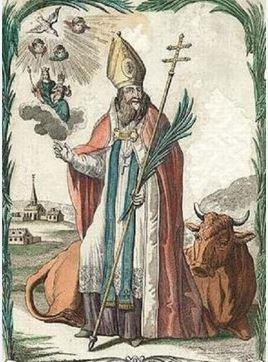Saturninus von Antiochia

Saturninus of Antioch (also Satornilos or Saturninos) was an early Christian theologian and a prominent representative of the Gnostic movement in the 2nd century. He is described in some sources as a bishop of Antioch and a disciple of the Apostle Peter, although precise historical details about his life and teachings are limited.
Background and Life:
Period: Saturninus probably lived in the 2nd century AD and was an important figure in the early centuries of Christianity, when various Christian denominations and heresies (deviating doctrines) developed.
Disciple of the Apostle Peter: Some sources report that Saturninus was a disciple of the Apostle Peter and spread the Apostle's teachings. However, it is unclear to what extent he was personally connected with Peter and how much his teachings differed from those of the Church of Antioch.
Teachings and Gnosticism:
Saturninus is best known for his Gnostic teachings, which differed from orthodox Christian doctrine. Gnosis is a term that refers to a secret knowledge of the divine and spiritual truth that can only be understood by initiated believers.
Dualism: Saturninus, like many other Gnostics, held a dualistic worldview. This meant that he viewed the material world as bad or negative, in contrast to the spiritual world, which was considered good and divine. This view was typical of many Gnostic movements, which often viewed the material universe as the result of a flawed or evil creative process.
Creation and the Demiurge: Saturninus taught that the Demiurge—a lower, imperfect being—created the material world. The Demiurge was described as an interpersonal or divine being who created the world but was not the true, higher God. The true divine entity was the spiritual, transcendent "God the Father" principle that existed beyond the material world.
Jesus and Salvation: Saturninus held the view that Jesus did not actually live on earth as a human being, but rather was a divine apparition or a manifestation of the higher spirit who, as redeemer, opened the way to true, spiritual knowledge (gnosis) for believers. This view differs significantly from orthodox Christian doctrine, according to which Jesus was both God and man and brought salvation through his death and resurrection.
Antimaterial Approach: Like many other Gnostics, Saturninus taught that human beings are redeemed through spiritual knowledge rather than through physical practices or rituals. He viewed the body as a prison of the soul that had to be overcome to attain true, divine knowledge. This attitude led to a critical attitude toward the material world and everything related to physical existence.
Ethical Practices: Saturninus and his followers may also have practiced a form of asceticism or the rejection of worldly pleasures, which was also typical of many Gnostic movements.
Criticism and Heresy:
Church Rejection: Like many other Gnostic teachers, Saturninus was considered a heretic by the early Christian Church. His teachings were sharply criticized by Church Fathers such as Irenaeus of Lyons (in his work Adversus Haereses) and Tertullian. They rejected his dualistic worldview and his belief that the material world was evil.
Gnostic Heresy: Saturninus was considered a major proponent of the Gnostic heresy, which was considered dangerous by orthodox Christian theology because it challenged central Christian doctrines about creation, humanity, and the work of Christ.
Saturninus and the Early History of Christianity:
Saturninus of Antioch was a prominent representative of an important religious movement of the early Christian era. Although his teachings were ultimately rejected by orthodox Christianity, they contributed to the diversity of early Christian theology and reflect the broad spectrum of religious and philosophical ideas that existed in the 2nd century. The Gnostic movements, to which Saturninus belonged, left a lasting influence on the development of Christianity and shaped the theological debates of the early church.
Summary:
Saturninus of Antioch was an early Gnostic church member who promoted dualism and the notion of a demiurge who created the material world, which was considered evil and flawed. He taught that true salvation is not achieved through the body or physical actions, but through spiritual knowledge (gnosis). Like many Gnostic teachers.
He was condemned as a heretic by the Catholic Church. Despite his rejection by the Orthodox Church, his teachings contributed to expanding the diverse religious spectrum of the early Christian centuries.

